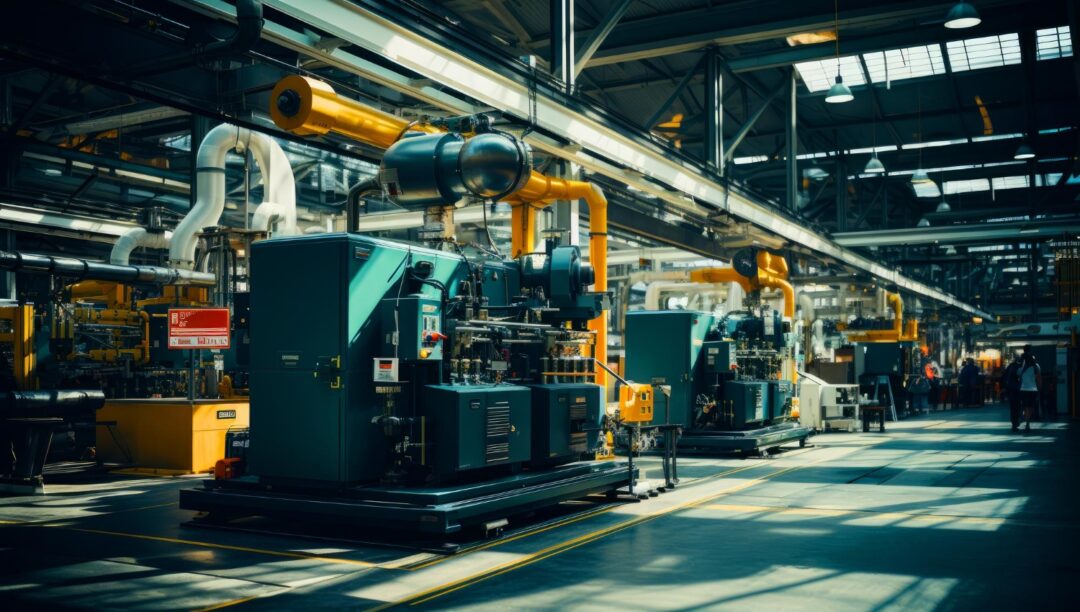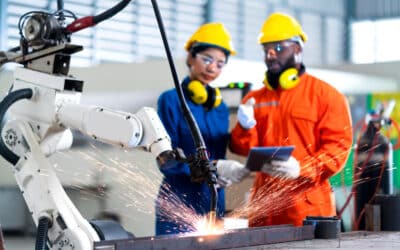Challenges for the manufacturing sector in 2024
As we start 2024, the manufacturing industry finds itself at a crossroads of various customer demands, technological advancements and sustainability imperatives. Whilst this may present opportunities, it will also leave some difficult challenges to overcome that may require changes in strategic direction. In this article, Craig Burton, who heads up our manufacturing sector team in Sheffield, reflects on some of the key challenges the sector faces in 2024 and explores potential solutions.
Supply chain disruption
Over the past few years, the global supply chain has been tested by the disruptions caused by Brexit, the pandemic and geopolitical tensions, particularly the war between Russia and Ukraine. Increased geopolitical tensions, for example, the conflict in the Gaza Strip are causing further challenges to the international supply chain – the most significant of which is the disruption to the Red Sea trade route between Europe & Asia. Cargo transported by sea between Europe and Asia in most cases is taking a much longer route around the southern tip of Africa resulting in more expensive and longer delivery times.
Through this period, manufacturers could look into solutions to enhance supply chain resilience by diversifying supply chains, stockpiling key materials and adopting digital technologies to have real-time monitoring and risk mitigation of inventory management.
Global economic uncertainty
The global economy is currently experiencing significant volatility which is likely to have an impact on UK manufacturing.
Fluctuating currency values
Exchange rates are fundamental for international trade and constantly change based on the supply and demand of services and products. Exchange rates are also impacted by political factors such as the US Presidential Election in November 2024 and the UK General Election which is likely to take place in the second half of 2024. Any sign of political instability may negatively affect the value of the pound. Any serious fluctuation could cause risks for manufacturers engaged in importing and exporting when it comes to pricing strategies and profit margins.
Manufacturers engaged in importing and exporting should consider strategies for mitigating against currency fluctuations, by, for example, entering into forward currency contracts, or creating ‘natural hedges’ by importing and exporting in the same currency, where possible.
Economic policies of major economies
In 2023, inflation was one of the main issues that countries around the globe were looking to tackle. This resulted in interest rates being hiked to drive inflation down. Although inflation in the UK has reduced, it is expected that major economies around the globe will continue to keep interest rates comparably high through 2024. However, any changes in policies would impact global economic conditions and could change demand for certain products, materials and services.
Global trade policies
Established trade relationships can be disrupted by changes to trade agreements or the imposition of tariffs and trade barriers, much like what we saw after the UK left the European Union. In 2024, it is expected that the European Union will announce new international trade policies as they aim to become the first climate-neutral continent in the world. The most likely outcome for UK manufacturers that regularly trade with EU countries will be additional compliance checks, market access restrictions and supply chain disruptions and costs.

Technological advancement
2023 was a significant year for technological advancement in the manufacturing sector. These advances can present significant manufacturing challenges to overcome such as:
Skilling up your workforce
As technology evolves, manufacturers will need to train their skilled staff to operate new technologies with efficiency and competence. Staff training costs are significant for manufacturing businesses using new technologies such as AI and automation software. Manufacturing businesses need to budget for these additional training costs, and it is important to prioritise training on these new technologies, not just repeat the training that has always been undertaken.
Investing in new technologies
Any new technology requires significant capital investment, and given the current rapid pace of technological advancement, keeping up can be a challenge. For many manufacturers, particularly small and medium-sized manufacturing businesses, finding the capital for these investments can be difficult. However, the Made Smarter programme and government’s Advanced Manufacturing Plan, with £4.5bn of funding, may enable some SME manufacturers to make the investments required.
Staying ahead of the competition
Manufacturers need to not only keep pace with technological advances but to stay ahead of their competitors. Adopting AI and Machine Learning (ML) technology to improve the efficiency of your supply chain management, production schedules and overall manufacturing operation is an opportunity to become as efficient as possible.
Cyber security risks
New technologies bring new cyber security risks. Being cyber secure is a crucial challenge for any business not just manufacturers. A cyber security breach can be detrimental to the future of any organisation. It is good practice to ensure the company has robust policies and procedures in place to mitigate against such a breach and that all staff are trained on cyber security awareness.
Environment and sustainability
The manufacturing sector is one of the most affected sectors by environmental and sustainability concerns across the globe. In 2024, manufacturers will be under more regulatory and customer pressure to produce greater sustainably. Circular economy principles are expected to become a hot topic in the global sector in 2024.
Circular economy principles
Circular economy principles are the practice of extending the life of raw materials and will present significant challenges for manufacturers to overcome to achieve this. Collaboration with the entire supply chain will be critical. Shifting the mentality of the production lines from the linear ‘take, make, dispose’ to the circular ‘reduce, reuse and recycle’ will consume significant time and resources. But, this is a step that the sector must take if it wishes to become more sustainable and meet the demands of consumers.
Merging Technology & Sustainability
Smart Manufacturing is not a new concept, however, AI and ML algorithms are expected to optimise the manufacturing process, reducing waste, and improving energy efficiency. This technology, combined with the ‘Internet of Things’ will allow manufacturers to monitor real-time data on energy use, waste generation, and other environmental impact metrics allowing for immediate adjustments to improve sustainability.
Cost Benefits
Cost increases over 2023, such as rising inflation, interest rates and high energy costs could have a negative impact on manufacturers’ sustainability goals. However, investments that future-proof manufacturers in sustainability can pay dividends down the line through reduced costs, eg energy costs and meeting customers requirements. Manufacturers may not have to bear these costs alone where government funding is set to become available through the Advanced Manufacturing Plan and local Green Business Programmes.

Skilled labour shortages
Skilled labour shortages have been an issue for manufacturers since the UK left the EU. However, in recent years several new factors have now contributed to the shortage of labour.
Aging workforce
This is one of the most pressing issues. Each year that goes by, more and more experienced skilled workers are leaving the sector due to retirement. Manufacturers are looking to overcome this issue by investing in training programs to help their younger staff gain more experience and offering higher wages where possible to encourage new employees into the sector which is increasing labour costs.
Misconception of the industry
The public perception of the manufacturing industry tends to be low-skilled, long hours and low wages. Manufacturers need to work on updating this perception in their employer brand marketing as robotics and automation in the digital age have changed this ‘dated’ perception of the industry with more tech-focused and highly skilled roles now available.

Manufacturers enter 2024 with increased optimism
Despite the challenges that UK manufacturers are expected to face in 2024, a recent survey from Make UK and PwC of over 200 senior manufacturing executives in the UK shows that manufacturers are entering 2024 with increased optimism compared to 12 months ago. Key findings from the survey include:
- Britain’s manufacturers are viewing the UK as a more competitive place to locate their activities compared to Germany, France, Spain and Italy.
- Manufacturers are more confident about sector prospects but are aware of the UK and global economic conditions deteriorating.
If you have any questions about the contents of this article, please do not hesitate to contact us.
How can we help?
Hawsons has a dedicated team of specialist manufacturing and engineering accountants in Sheffield, Doncaster and Northampton.
Our specialist team offers a wide range of services which are tailored to meet your individual needs. Our understanding of the issues faced by the manufacturing and engineering businesses means that we can proactively seek out ways for you to maximise your profitability and minimise your tax liabilities.
Related content
Government launch Critical Imports and Supply Chain Strategy
Responding to recent import and supply chain challenges, on 17 January 2024 the UK government launched the Critical Imports and Supply Chain Strategy, an initiative aimed at improving the nation's ability to adapt to global disruptions in the face of adversity. ...
UK government publish Advanced Manufacturing Plan
On 26th November, HMRC's Department for Business & Trade unveiled its much-anticipated Advanced Manufacturing Plan. This plan was released shortly after the chancellor announced £4.5 billion in funding for growth and innovation in the manufacturing sector. The...
Manufacturers request major overhaul of UK business tax and regulation
UK manufacturers are requesting that the Chancellor, Jeremy Hunt, announces an overhaul of the UK’s business tax and regulatory rules in the Autumn Statement to boost investment plans. The call from manufacturers to make these changes came from a survey that was...





